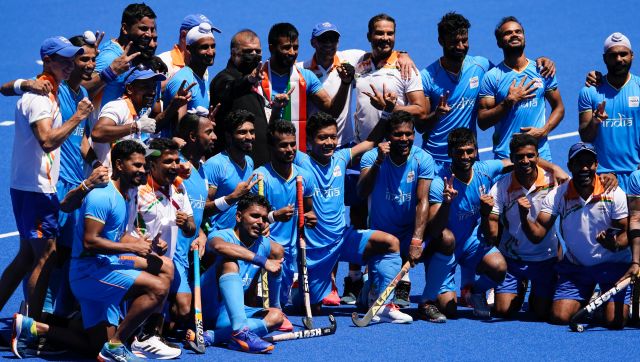
To be among top Olympic nations, Indians must snap out of the Bronze Age of the mind

India beat Germany 5-4 in the bronze medal match at Tokyo Olympics. AP
Here is a very unpopular opinion: Indians should stop gushing every time their team enters the semi-finals, bags the bronze, or even returns with the silver. It does not mean that we dismiss these achievements. We simply need to acknowledge the team’s talent and hard work to get to the advanced stages of the highest sporting arena of the world but also assess what more we needed to stand at the highest podium of excellence.
When the Indian athletes lose to a worthy opponent after performing brilliantly, we say, “They lost, but they won our hearts.” Or, “our bravehearts went down fighting”.
You win hearts in arts — an impassioned novel, a soul-stirring song, a moving film. In sports, you just win. Or lose.
Anything less than gold does not deserve a carnival of the nation’s emotions. History usually does not remember silver or bronze medallists. It certainly does not even cursorily record the names of those who go down valiantly fighting for bronze.
When discus-thrower Kamalpreet Kaur reached the Tokyo 2020 finals or the Indian men and women hockey teams reached the semis, the entire nation celebrated. But when they lost, a crestfallen nation still lifted itself by the scruff and celebrated their effort.
When the men’s hockey team won the bronze in a humdinger against Germany on Thursday morning, one of India’s tallest industrialists, Anand Mahindra, tweeted: “I have suddenly become colour-blind. That Bronze looks Golden to me…”
I have suddenly become colour-blind. That Bronze looks Golden to me… #ChakDeIndia #TokyoOlympics2020
???????????????????????????????????????? https://t.co/0FHbNrtnA1— anand mahindra (@anandmahindra) August 5, 2021
It is a kind, well-meaning tweet. But no, Mr Mahindra, bronze will never be gold, even if our nation is winning an Olympics medal in hockey after 41 years.
Nations that have truly excelled in sports have a certain indomitable drive, ambition and ruthlessness to them. They do not accept anything less than a win easily. The Australian hockey coach apparently threw a fit after the team’s surprise defeat to India. Most Australians are still in shock.
In spite of winning a litany of golds for the US in the past, star gymnast Simone Biles has been widely panned by fellow Americans for letting the country down when she asked to pull out of her Tokyo event at the last minute because of “twisties”, a condition which can be loosely described as an athlete’s disconnect between the mind and the body. Although she got support from the media, large sections of the US public did not take it well. They expect their athletes to mentally absorb the pressure when competing at the highest levels.
China, of course, takes the ruthless pursuit of excellence to another level.
“Athletes regarded as potential gold medalists have been urged out of retirement, and some female stars have been urged to resume training and competing soon after giving birth,” reported the New York Times in 2008. “Previous gold medal winners, meanwhile, have heard for four years that failure to pull off a repeat victory will let the whole nation down. Many have trained for the Games despite serious injuries. A female weightlifter, Tang Gonghong, persevered until early this year despite having such high blood pressure that her chief coach said it ‘threatens her life at any moment’.”
In India, brilliant athletes like Jyotirmoyee Sikdar, Dutee Chand, Deepa Karmakar lose their winning streak and hunger in the maze of accolades, government jobs and a few rewards.
China now uses aerospace technology and simulated environments to train its athletes. Indian politicians queue up to felicitate sportspersons the moment they enter the semifinals, even when the event is on.
In China, just five- to six-year-olds are made to perform almost impossible stretches, swing deftly on the beams and bars, hang from high rings, and sprint across floor mats at shockingly tough training sessions.
In contrast, seeds of India’s lack of sporting competitiveness are sown right from childhood. Children are told, “Participation is the key, winning is not.” Parents forbid their wards from adventure sports or anything that pushes their boundaries and put them at even the slightest controlled risk. In the absence of a social security network, Indian parents subliminally view their children, especially sons, as some kind of old-age insurance.
And to top it all, centuries of invasions, colonialism and colonial education has taught Bharat that aggression or ambition is a sin, whether on a sports arena or a battlefield.
Indian cricket has shed this meekness after winning the 1983 World Cup and since Jagmohan Dalmiya and Sourav Ganguly brought a certain brazen, in-your-face aggression to the game. We do not accept even a loss in the finals. We ask for the captain’s or coach’s head even if we draw a Test series against a strong opponent.
Which is why today we are the cricket champions.
It is time the nation sheds its ennui when it comes to the rest of Indian sports. We must not go overboard celebrating anything less than gold. Every time.
Only then can India become a true sporting nation.
Stay connected with us on social media platform for instant update click here to join our Twitter, & Facebook
We are now on Telegram. Click here to join our channel (@TechiUpdate) and stay updated with the latest Technology headlines.
For all the latest Sports News Click Here
For the latest news and updates, follow us on Google News.

